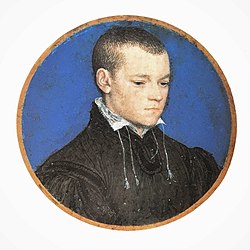Gregory Cromwell | |
|---|---|
| Baron Cromwell | |
 | |
| Coat of arms |  |
| Tenure | 1540–1551 |
| Successor | Henry Cromwell, 2nd Baron Cromwell |
| Known for | Son of Henry VIII's chief minister, Thomas Cromwell, 1st Earl of Essex |
| Born | c. 1520 London[2] |
| Died | 4 July 1551 (aged 30–31) Launde Abbey, Leicestershire, England |
| Cause of death | Sweating sickness |
| Buried | Launde Abbey Chapel 52°37′52″N 0°49′23″W / 52.631111°N 0.823056°W |
| Residence | Launde Abbey |
| Locality | Leicestershire |
| Spouse(s) | |
| Issue |
|
| Parents | |
Gregory Cromwell, 1st Baron Cromwell, KB (c. 1520[1][3] – 4 July 1551)[4] was an English nobleman. He was the only son of the Tudor statesman Thomas Cromwell, 1st Earl of Essex (c. 1485 – 1540) and Elizabeth Wyckes (d. 1529).[5][6][7]
Gregory's father Thomas Cromwell rose from obscurity to become the chief minister of Henry VIII, who attempted to modernize government at the expense of the privileges of the nobility and church. He used his office to promote religious reform and was one of the strongest advocates of the English Reformation.[8][9][10]
In 1537, Gregory married Elizabeth, Lady Ughtred, widow of Sir Anthony Ughtred, sister to Jane Seymour and therefore became brother-in-law to Henry VIII and uncle to Edward VI.[11] Gregory survived the dramatic fall from royal favour and subsequent execution of his father in 1540, as well as the ousting of his brother-in-law and patron, Edward Seymour, in 1549. He became a wealthy landowner, owning land and property in several counties in England, mainly in Rutland and Leicestershire.[12][13] Gregory's family connections had provided him with wealth, property and privileges; however, it was through his own intelligence and ability, combined with the remarkable education and training provided by his father, that he was able to benefit from them, leaving his wife and family well provided for at his death. Gregory was succeeded by his eldest son, and heir, Henry.[5]
Gregory Cromwell died in July 1551. He may be the subject of two portrait miniatures by Hans Holbein the Younger.[1]
- ^ a b c Fitzgerald and MacCulloch 2016.
- ^ Leithead 2008:"By 1520 [Thomas] Cromwell was firmly established in London mercantile and legal circles."
- ^ Ellis, third series I 1846, p. 338 Introductory notes.
- ^ Cokayne III 1913, p. 558.
- ^ a b Cokayne III 1913, pp. 557–559.
- ^ Strype II(I) 1822, pp. 493–494.
- ^ Hawkyard 1982.
- ^ Bernard 2007, p. 513.
- ^ Underwood 2004, pp. 517–539.
- ^ Slavin 1979, pp. 3–19.
- ^ Schofield 2011, p. 288.
- ^ Letters and Papers, Foreign and Domestic, Henry VIII, 16, 580(49).
- ^ Wright 1684, p. 97.